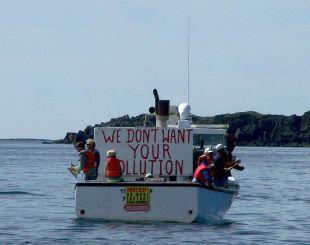You are here
Cooke company pleads guilty to illegal pesticide use

Long Island fisherman Sheldon Dixon and 20 other boats protested the salmon cages when they were first installed back in 2011.
Published on April 26, 2013
Jonathan Riley
Cooke Aquaculture’s subsidiary, Kelly Cove Salmon, has pled guilty to charges of using an illegal pesticide in a marine environment.
The company was ordered to pay $500,000 in fines and payments in provincial court in St. Stephen, New Brunswick today, Friday April 26.
An Environment Canada press release says this is “one of the largest and most significant penalties ever levied in Canada under the Fisheries Act.”
The company pled guilty to using cypermethrin in fish-bearing waters in southwestern New Brunswick.
Originally in November 2011, Environment Canada charged not only the company but CEO Glenn Cooke, vice president Michael Szemerda and regional manager Randy Griffin as well.
Those charges were in relation to reports from lobster fishermen in southwestern New Brunswick who were finding dead and dying lobsters in their traps.
Environmental enforcement officers subsequently collected samples of the affected lobsters from Grand Manan and Deer Island, as well as fish, mussels and kelp in the areas where the lobsters were found. These samples were sent to Environment Canada’s lab in Moncton for forensic analysis. Results proved the dead lobsters collected in Grand Manan and Deer Island were exposed to cypermethrin.
Cypermethrin is not permitted for use in marine environments because of its proven toxicity to shellfish, including lobsters and shrimp.
Environment Canada says Kelly Cove Salmon used the pesticide on 15 separate sites to address a major sea lice infestation knowing that it was illegal to do so.
An intensive two-year investigation was carried out by Environment Canada’s enforcement officers. Environment Canada’s Atlantic Laboratory for Environmental Testing conducted much of the research used in this case.
The company will have to pay $100,000 in court fines, $250,000 will be directed to scholarships, $100,000 will go to environmental studies and research projects and $50,000 goes into Enviroment Canada’s Environmental Damages Fund.
Glen Cooke said in a prepared statement that they pled guilty in order to relieve staff and customers from a lengthy and public court battle.
“We made the difficult decision not to fight these charges even though we question the allegations,” he said.
He outlined the many steps they had taken to control sea lice in their salmon pens and said because of warmer temperatures they wouldn’t be stocking some farms in New Brunswick.
“We cannot stock these farms until the industry has access to a full suite of pest treatment and management tools,” he said.
He has in the past said it is easier to farm fish in Maine. Cypermethrin is legal for use on fish farms in the U.S.
Cooke Aquaculture, while based in New Brunswick, has aquaculture sites in Digby and Shelburne Counties in Nova Scotia also.
Fishermen on Brier Island and Long Island have expressed fear about pesticides affecting the local lobster fishery since they first heard in 2009 that Cooke Aquaculture was coming here.
“There’s been an enormous amount of fear,” said Karen Crocker of Freeport and chair of the St. Mary’s Bay Coastal Alliance after hearing of the conviction. “We’re scared of what’s needed for them to grow healthy fish. These pesticides keep their fish healthy but what effect does it have on non-target species like lobster?”
Crocker says the convictions could hurt local efforts to market their lobster.
“We market sustainable,” she said. “We market our fish as the best lobster in the world because they are caught in pristine clean water. Our fish are organic and pesticide free.
“A stain on our product could last forever—think what mad cow disease did to beef. If dead lobsters start rolling up on the shore here, it’s hard to come back from that. We don’t want people to see our product as tainted.”
Crocker says she is happy to see Environment Canada is keeping an eye on the aquaculture industry.
“At least one agency is,” she says. “But here we have our provincial government just gave $25 million to a company that’s been convicted of illegal pesticide use.”
Nova Scotia’s NDP government gave Cooke Aquaculture a $9 million forgivable loan in the summer of 2012 in return for the promise of creating 400 jobs in Nova Scotia by 2015. They also gave them a $16 million loan of which $4 million is forgivable if they reach certain research and development targets.
The federal government has never said how many millions it gave Cooke Aquaculture in compensation after the Canadian Food and Inspection Agency ordered them to kill 750,000 fish in Shelburne after an outbreak of Infectious Salmon Anemia there.
Cooke Aquaculture brings in almost $570 million in annual revenue.
Aquaculture company on the hook for $500K for pesticide use
Kelly Cove Salmon pleaded guilty to 2 charges related to deaths of lobsters in Bay of Fundy
CBC News
Apr 26, 2013

Environment Canada found the dead lobsters
had been exposed to cypermethrin, an agricultural
pesticide that's illegal for marine use in Canada. (CBC)
A New Brunswick aquaculture company has been ordered to pay $500,000 after pleading guilty to two charges in connection with the deaths of hundreds of lobsters in the Bay of Fundy from an illegal pesticide about three years ago.
The penalty against Kelly Cove Salmon Ltd. is the largest ever imposed in New Brunswick for environmental violations under the federal Fisheries Act, according to an Environment Canada official.
And "it's in the top three fines in Canada," said Robert Robichaud, regional operations manager for the environmental enforcement division in New Brunswick.
"We feel that it will definitely send strong message, not only to the aquaculture sector, but to other marine users, that the illegal use of pesticides is simply not tolerable."
Read the whole article here
Copyright APES 2012 Website by Ionsign Online

